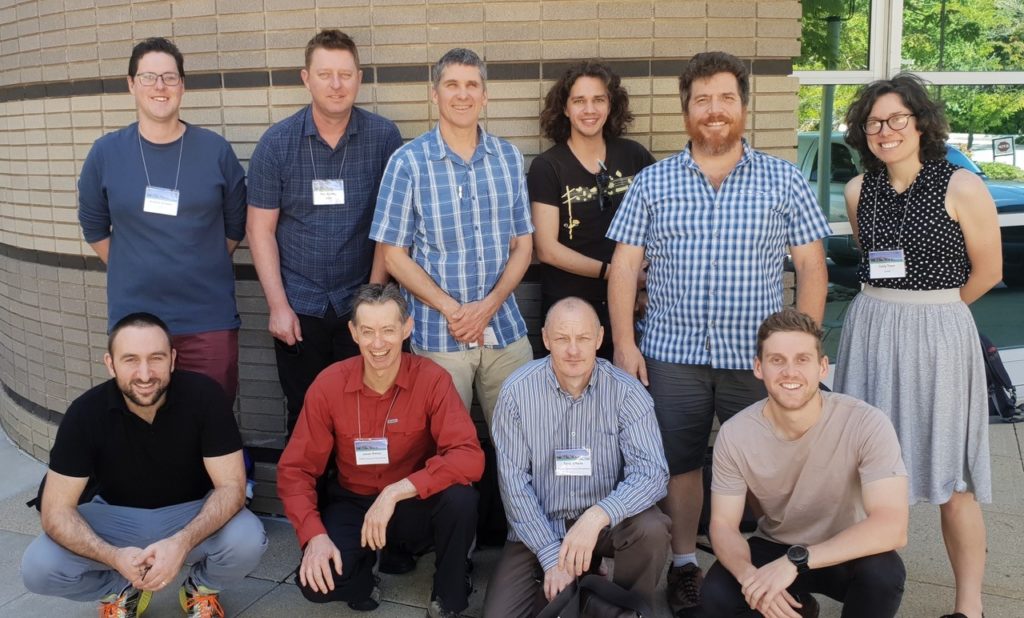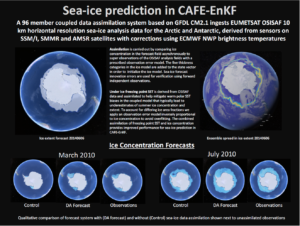Research Highlights
DCFP Staff attended the following conferences:
- DCFP’s Courtney Quinn was invited to speak at the workshop on Critical Transitions in Complex Systems 2020, which took place online from 29-31 July 2020. This workshop focused on developing a mathematical theory for sudden changes in the dynamical behaviour of complex systems – critical transitions. Courtney discussed her recent work with other members of the Decadal Climate Forecasting Project on analysing the dynamics of empirically derived reduced models for atmospheric teleconnections. The group took a particular interest in the transitions between states within the cluster-based models, looking for signals in the finite-time dynamical properties on varying timescales.
- Courtney Quinn and Terry O’Kane organised a mini-symposium for the Society for Industrial and Applied Mathematics’ (SIAM) Mathematics of Planet Earth Conference 2020, which took place online on 3-14 August 2020. Terry and Courtney organised a session around ensemble prediction methods and gathered speakers from the National Oceanic and Atmospheric Administration, the Royal Meteorological Institute of Belgium, the University of Hamburg, and the University of Exeter to speak on their work in this area.
Their session considered ensemble methods, or the use of simultaneous Monte Carlo sampling, which have been widely employed in the areas of atmosphere, ocean, and climate modelling. - Vassili Kitsios presented a paper at the Consortium for Ocean-Sea Ice Modelling in Australia (COSIMA) Conference, held online on 7 May, 2020. Vassili presented his and fellow authors’ (Paul Sandery, Terry O’Kane, Paul Sakov, and Russ Fiedler) research on Ensemble transform Kalman filter parameter estimation of ocean optical properties for reduced bias in a coupled GCM.
2019
- Chris Chapman attended the ‘International Conference on Ocean Fronts and Eddies’ (ICOFE) in Zhoushan, China on the 27th to the 31st of October 2019.
Chris’ invited plenary presentation was titled: “New Perspectives on Southern Ocean Fronts, Jets and their Variability“. - Vassili Kitsios presented his research (detailed below) at the following forums:
-Uncertainty Quantification Workshop (ANU Canberra, November 2019)
-AustMS (Monash University, Melbourne, December 2019)
-ANZIAM (Hunter Valley, February 2020)
Vassili presented his work on “Reducing forecast model bias in coupled general circulation models via Ensemble Kalman filter parameter estimation”. In climate simulations there are many model parameters some of which are known with little precision. The biases observed in these complex multi-disciplinary multi-scale simulations can be highly sensitive to the specification of such parameters. Within a data assimilation (DA) framework he along with his co-authors developed a systemic approach to estimate such model parameters, with the intention to reduce model bias and hence improve forecast skill. In general, DA provides the ability to modify imperfect numerical simulations of reality with a series of incomplete and possibly noisy measurements, ideally resulting in a better estimation of the true system state, and here also an estimate of the model parameters. For the experiments undertaken within, we adopt the CSIRO Climate Analysis Forecast Ensemble (CAFE) system, which employs the ensemble transform Kalman filter. The system is run with an ensemble of 96 general circulation models of the coupled atmospheric, oceanic, and sea-ice Earth system. Certain learned parameters during the DA experiments were able to reduce the bias present in out-of-sample multi-year climate forecasts. - Courtney Quinn served on the panel during the Women in Applied Mathematics Lunch, which was part of the Australia and New Zealand Industrial and Applied Mathematics (ANZIAM) conference in early February 2020 in the Hunter Valley. The panel comprised of four women scientists all at varying stages of their career, with Courtney representing the postdoctoral stage. Each panel member gave a short summary of their careers thus far, highlighting challenges and things that have helped them along their journeys. At the end of the lunch there was a lively discussion in which the panel members attempted to address the comments and questions of the other attendees.
- Vassili Kitsios and Dylan Harries attended the CliMathNet Thematic Workshop ‘Mathematics of the Economy and Climate’ in Soesterberg, Netherlands (15 – 17 July 2019). The workshop was a collaborative event, with the aim of bringing together climate scientists, mathematicians and economists, in order to improve our understanding of the role of climate change on the development of economic systems. The program consisted of a series of presentations and a discussion session with topics including the incorporation and quantification of the impacts of climate change and extreme events in economic models, modelling of policy options for climate change mitigation and adaptation, and recent developments in modelling methods.
- Carly Tozer and James Risbey attended the Workshop on Correlated Extremes in New York, May 2019. Correlated extremes are extremes that occur across multiple, remote locations at the same time. Carly presented her work on the large-scale atmospheric processes associated with correlated rainfall and temperature extremes in the southern hemisphere.
- Courtney Quinn attended the 6th Critical transitions in Complex Systems (CRITICS) workshop, 25 – 29 March 2019, Imperial College London. The focus of the meeting was on characterizing and predicting the occurrence of sudden and unexpected changes in the state of complex systems that are triggered by small and slow changes in external trends or inputs. The topics ranged from mathematical theory of critical transitions to examples from the natural world (e.g. climate, biology, ecology), technology and society.
- Courtney also attended the Society for Industrial and Applied Mathematics (SIAM) Conference on Applications of Dynamical Systems, 19 – 23 May 2019, Snowbird, Utah, USA, which was focused around increasing communication between those who develop dynamical systems techniques and the mathematicians, scientists, and engineers who use them across fields such as biology, chemistry, physics, climate, finance, industrial mathematics, and data science.
- Amanda Black recently presented at the American Meteorological Society 22nd Conference on Atmospheric and Oceanic Fluid Dynamics in Portland, Maine at the end of June. Amanda’s presentation was titled: “Effects of Diurnal Cycle Mode Intensification on Warm Season Precipitation Trends over the U.S. Corn Belt”.
- Amanda will also be presenting at the American Geophysical Union 2019 Fall Meeting in San Francisco in December. Her presentation will be titled: “A Dynamically-Based Investigation of Australian Northwest Cloudbands and their Relationship to Atmospheric Rivers and Heavy Precipitation”.
- Doug Richardson and Dougie Squire presented posters at the 14th International Meeting on Statistical Climatology in Toulouse in June. This meeting is held roughly every three years to facilitate communication and interaction between the climate and statistics communities, and to promote good statistical practice in climate science. Doug presented a weather pattern approach to forecasting UK precipitation that is more skillful than other conventional approaches in winter and autumn. Dougie presented a systematic assessment of artificial skill in forecasts of the El-Nino—Southern Oscillation.
- Dougie Squire and Thomas Moore and I will be attending the 2019 Pangeo Community Meeting in Seattle from the 21st-23rd August.
Pangeo is a community platform for big-data geoscience, offering interactive data exploration workflows that scale to meet current and future needs. The meeting will include a combination of presentations, working group sessions, and coding “hackathons” for hands-on development of the Pangeo ecosystem.
Sub Seasonal to Seasonal (S2S) Prediction & Seasonal to Decadal (S2D) Prediction Conference, Boulder, Colorado
On the week of the 17th until the 21st of September, 10 team members from the Decadal Climate Forecasting Project travelled to Boulder in Colorado to attend the International Conference on Sub Seasonal to Decadal Prediction.
For more information about the conference and to view the presentations, click here


